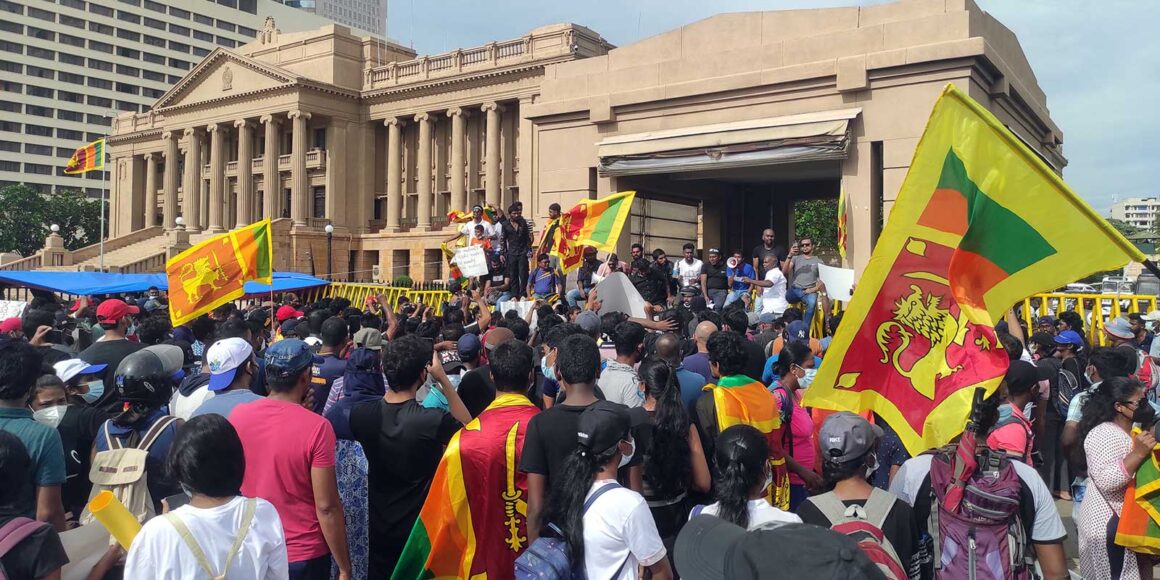

By Peter Main
SRI LANKA, once hailed as a model of post-colonial development, is today facing the complete collapse of its economy. Three-day queues for basic foods, 12-hour blackouts, scarcity of cooking gas and petrol have spurred a mass revolt across the island. The instinctive response to this by the government, headed by the Rajapaksa bothers, Gotabhaya, Mahinda and Basil, was harsh repression: declaration of a curfew, then a full state of emergency, then live bullets.
The revolt was not suppressed; it surged forward, crowds besieging the President’s office and the prime minister’s home. First Basil resigned, then the rest of the government with the exception of Mahinda, then even Mahinda went, but still Gotabhaya, the President, hangs on.
Desperate, from his residence he appealed for an all-party coalition to save him. Opposition politicians loudly rejected any such rescue, while quietly pointing out they could support individual policies. Only the five times failed prime minister, Ranil Wickremasinghe, the one remaining MP of the once dominant United National Party, offered him a lifeline by again becoming prime minister.
Abroad, the ‘new government’ begged for funds from the IMF, the Asia Development Bank, China, India, anywhere. Some short-term emergency funds have been released, but Sri Lanka has debts of US$51 billion, and reserves of less than US$50 million. There will be no substantial finance until there are policies in place to guarantee repayment—and that means even more hardship for the people.
General strike
The Trade Union Coordinating Committee and the Collective of Trade Unions and Mass Organisations responded to a further round of repression, plus gas attacks and hundreds of arrests, by calling a general strike. This is the most promising feature of the entire Sri Lankan crisis. It is within this movement that the seeds of a transformed Sri Lankan society can grow.
The grassroots organisations necessary to spread and maintain the strike, the provision of food and other supplies to strikers and the building of links above the local level can all be used to revive and rebuild a working class movement that collapsed and fragmented after the defeat of the 1980 general strike.
That potential, however, is neither automatic nor guaranteed. There are thousands of small trade unions, whose members could play a key role in this revival. However, many of them have links to liberal and bourgeois political parties. Their members should demand the ending of all such connections. Socialists should argue not only for the amalgamation of small and ineffective unions into mass, democratically controlled organisations, but for those organisations to take the initiative in the formation of a new workers’ party.
The workers’ movement should also draw in women’s and students’ organisations. Already, the Inter-University Student Federation, strongly influenced by the Frontline Socialist Party, has played a leading role in the “GotaGoHome” movement. Every effort should be made to integrate such youth movements into the workers’ movement at all levels.
Strategy
What unites all the different strands of the movement at the moment is the demand for Gotabhaya Rajapaksa to resign as President. Socialists should certainly support that demand, but they also need to go beyond that—if he goes, what then? The crises that have shaken Sri Lanka for decades surely prove that the existing political system cannot serve the interests of the mass of the people.
The movement should raise the demand for a Sovereign Constituent Assembly that can determine how the country is to be ruled in the future. The organisations created to remove the Rajapaksa clan should themselves control the convening of such an Assembly, guaranteeing equal voting rights to everyone living and working on the island.
Within that, socialists will argue for a workers’ and farmers’ government, based not on parliamentary constituencies but on their own organisations and recognising the right of the Tamil population to self-determination and, if they wish it, secession. But the creation of a powerful multi-ethnic workers’ movement, both trade union and political, would be the surest road to ending all forms of racism and national chauvinism.
To deal with the economic crisis it will be necessary to nationalise, without compensation, all the major sectors and to subject them to democratically accountable planning in the interests of the great mass of the population. All debts to foreign banks and corporations, taken out by successive capitalist governments, should be renounced and an appeal made to the workers of the world for support and solidarity.